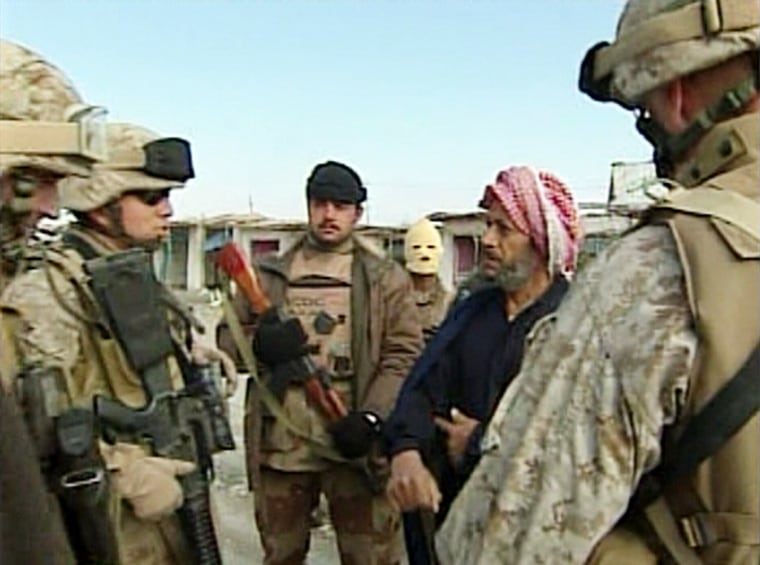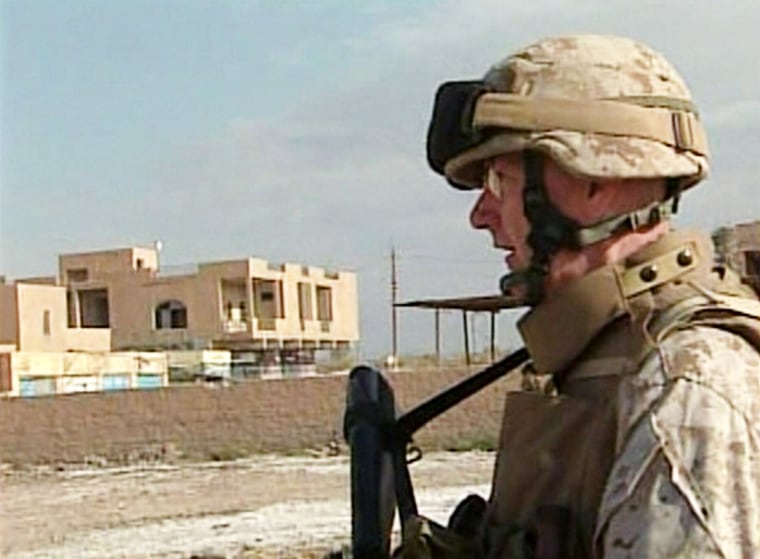Under a shining sun, the market stalls in Yusufiya, a town 25 miles south of Baghdad, stood nearly empty. A Marine knelt down on one knee and looked across the street.
He motioned over to the rest of his patrol. Howls from a roaming pack of dogs pierced the eerie silence. The mosque’s tall minaret loomed nearby. The patrol moved into the middle of the road. A fruit-and-vegetable seller glanced at the Marines and managed a weak smile.
The Marines are members of the 2nd Battalion 24th Marine regiment, and a big part of their mission is to hunt down insurgent cells in their operational area. The region between the Tigris and Euphrates rivers, just south of Baghdad, is an insurgency stronghold, according to American commanders.
Chief Warrant Officer Jim Roussell and Major Dan Whisnant, members of the battalion’s intelligence section, joined this patrol by 2/24 Fox Company.
They were out canvassing the area to gather any information that would help them track down the perpetrators of a car bomb attack in mid December that claimed the lives of two young Marines: Lance Corporal Richard D. Warner and PFC Brent T. Vroman.
The Marines were killed during a similar patrol a few days earlier when a car bomb exploded in the middle of Yusufiya’s recently opened marketplace. An Iraqi man also was killed and four other civilians were injured, seemingly another day in Iraq.
Re-enlisting with gangland experience
Roussell, 53, came out of military retirement to re-enlist. A police sergeant in Chicago, he brought years of gang-related experience. Overlapping police tactics with military procedures has added to the arsenal in the fight against the insurgency.
“The insurgents might have different ideology than gang members but basically they use the same mechanics,” said Roussell. “They hide in plain sight among the people.”
As the patrol secured both ends of the main market street, Roussell and Whisnant walked up to an elderly man. Through a military interpreter they struck up a conversation with the Iraqi.
Through a mix of snitches, informants, and intelligence gathered by Marines and the Iraqi National Guard, they plan to build a database on the insurgents. Their goal is to put names to the faces.
“Their center of gravity is to be invisible. Once I know where you live, it is over,” Roussell said.
On the offensive
A few feet away from Whisnant and Roussell, a young Iraqi male, all dressed in black, ambled down the street. A couple of the Marines asked him to step to a corner and called the translator over. After a few minutes of questioning, the young man was allowed to pass.
“We need to continue to be on the offensive,” said Whisnant.

Roussell pointed out how the Marines have to call on a new set of skills in dealing with the Iraqis. “Most target intelligence comes from the bottom to the top,” he added, “So that makes every Marine on patrol a collector of information.”
Back at Camp St. Michael, one of 2/24’s Forward Operating Bases, the day’s blindfolded detainees are lined up in front of a processing center.
They are fingerprinted and photographed, then given a retinal eye scan. An interrogation ensues. Those found innocent are released.
The rest of the detainees are taken to the 24th Marine Expeditionary Unit headquarters for further questioning. The serious cases are forwarded to Abu Ghraib prison in Baghdad.
Deploying gangland tactics
In their office, Whisnant and Roussell dissect every frame of a CD videotape they captured during an insurgent raid. On the wall hangs a chart that links people’s names under different criteria with lines crisscrossing from one column to another. It could double as gang organizational chart.
Getting insurgents to snitch on their colleagues has provided the intelligence unit with the most successful leads. “The bad guys have all the information and our people are able to fully harvest that information,” said Roussell.
Although the unit does not like to quote statistics, in a recent detainee group of almost two hundred people, all were sent to Abu Ghraib prison.
Lt. Colonel Mark A. Smith, the gruff and aggressive 2/24’s commanding officer, sang high praises for his Marines.
He boasted that FOX Company, based out of Yusufiya, captured more weapons and munitions than any other outfit in Iraq.
“People back in the States have to understand that this is gang-style warfare,” he emphatically announced. “To crack it takes patience and persistence.”
Uphill battle continues
Even Roussell admitted that although the new strategy has made a large dent in the insurgency abilities, it is still an uphill struggle.
“You are dealing with young, angry, disenfranchised people who pick up weapons” he said. “We can handle the military aspect but the other needs, political and economical, have to be met.”
On the way back from Yusufiya, a voice on the radio in Roussell’s humvee crackled out “IED ahead,” a reference to Improvised Explosive Device, the favored weapon of the insurgents.
Roussell drove a bit further down toward his base. A Marine unit had cordoned off a section of the road. The remnants of a suicide car bomb littered the area. Its target: a military convoy. Its victims: an Iraqi man and his donkey.
Roussell got out of his vehicle. As medics helped the wounded Marines from their Humvee into an ambulance (none were seriously injured), Roussell, machine gun in hand, was back on the streets patrolling — seemingly another day in Iraq.
